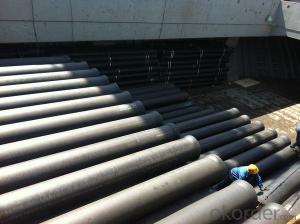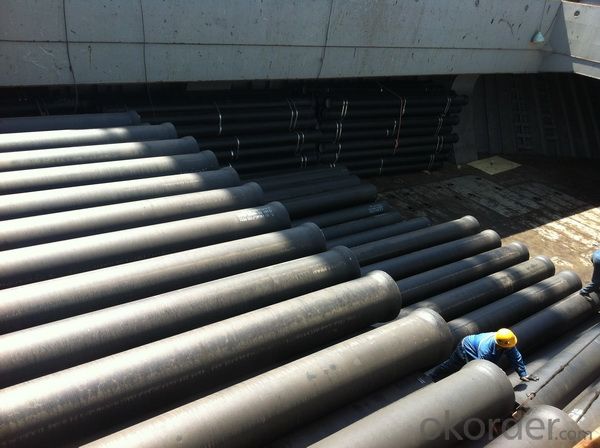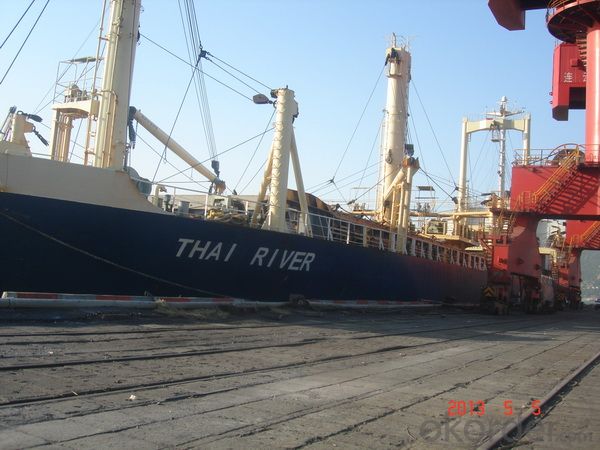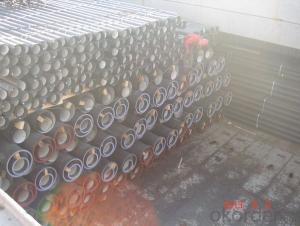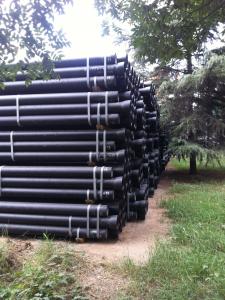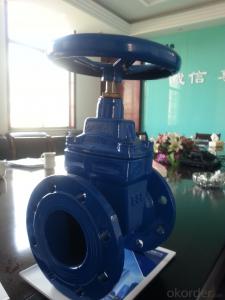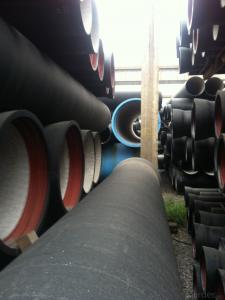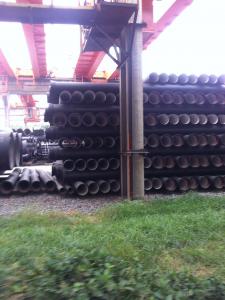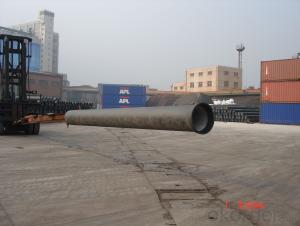DUCTILE IRON PIPES AND PIPE FITTINGS k8 CLASS DN100
- Loading Port:
- Tianjin
- Payment Terms:
- TT OR LC
- Min Order Qty:
- 22 pc
- Supply Capability:
- 3000 pc/month
OKorder Service Pledge
OKorder Financial Service
You Might Also Like
Material : Ductile Cast Iron
Size Range : DN 80mm to DN 2000mm
Unit Effective Length : 6m or 5.7m
Manufacture Standard: ISO 2531:1998/ EN 545:2006/EN 598:2007
Annual capacity : 200,000 tons
Coating Exterior: Zinc 130g/m2 according to ISO 8179-1 and bitumen coating 70 microns.
Cement Interior: Portland Cement/ High Alumina Cement/ Sulphate Resisting Cement Lining according to ISO 4179
Special requirements on external coating and internal lining can be applied
We also provide accessories such as SBR/EPDM rubber gaskets, lubricant paste, pipe caps, PE sleeves, etc.
Additional Parts:
Each pipe is strictly inspected according to related standard to ensure permanently high performance.
Easy Installation at site and service free for life
Long Service Lifespan
Quotation will arrive you within 24hours once we get your inquiry.
We guarantee offering you a competitive price.
A copy of original inspection reports of pipes will be offered after shipment.
Photos of loading process will be sent to the customer after shipment effect.
We will follow-up the delivery progress after shipment effect and update to the customer on weekly basis.
- Q: How does ductile iron pipe perform in extreme temperatures?
- Ductile iron pipe is renowned for its exceptional performance in extreme temperatures, thanks to its unique composition and manufacturing process. Its structural integrity remains uncompromised, allowing it to endure both high and low temperatures without issue. When it comes to high temperatures, ductile iron pipe showcases remarkable heat resistance. It can withstand temperatures of up to 1000 degrees Fahrenheit, making it perfect for applications involving hot liquids or gases, such as steam pipelines or industrial processes. Its strength and thermal stability enable it to maintain its shape and structural integrity even under extreme heat conditions, guaranteeing long-term reliability and safety. Similarly, ductile iron pipe excels in low-temperature environments. It can brave sub-zero temperatures without becoming brittle or prone to cracking, a common problem with materials like cast iron. This makes ductile iron pipe an ideal choice for applications in cold climates, such as water distribution systems in freezing temperatures. Moreover, the ability of ductile iron pipe to resist thermal expansion and contraction is another advantage in extreme temperatures. It has a low coefficient of thermal expansion, meaning it expands and contracts less compared to other materials. This property minimizes stress on the pipe, reducing the risk of leaks or failures caused by temperature fluctuations. In conclusion, ductile iron pipe demonstrates outstanding performance in extreme temperatures. Its heat resistance, ability to withstand low temperatures, and resistance to thermal expansion and contraction make it a reliable option for various applications, ensuring safe and efficient operations even in challenging environments.
- Q: How do ductile iron pipes handle water hammer in high-rise buildings?
- Known for their durability and strength, ductile iron pipes are an excellent option for managing water hammer in high-rise structures. Water hammer, a common occurrence when water flow abruptly halts or changes direction in pipes, causes pressure surges that can strain and potentially harm the pipes. Engineered to withstand high-pressure scenarios, ductile iron pipes exhibit remarkable resistance to water hammer. With their high tensile strength, these pipes can endure sudden pressure changes without warping or fracturing. This feature is especially crucial in high-rise constructions where water distribution must accommodate various floor pressures. Furthermore, the outstanding corrosion resistance of ductile iron pipes bolsters their ability to handle water hammer. Over time, corrosion weakens pipes, making them more prone to failure during pressure surges. However, the corrosion resistance of ductile iron pipes guarantees their structural integrity even in high-pressure circumstances. Moreover, the flexibility of ductile iron pipes enables them to absorb and dissipate the energy generated by water hammer. Consequently, the overall system experiences minimal impact, reducing the potential for damage. Absorbing energy also contributes to minimizing noise and vibrations associated with water hammer, thus enhancing the efficiency and comfort of the water supply system. To summarize, ductile iron pipes are well-suited to manage water hammer in high-rise buildings. Their strength, corrosion resistance, and flexibility make them a reliable choice for delivering water under varying pressures while upholding the system's integrity.
- Q: How do ductile iron pipes handle dynamic loads?
- Ductile iron pipes possess remarkable strength and durability, enabling them to effectively manage dynamic loads. These pipes exhibit a high resistance to bending and can endure the pressure and stress exerted on them when exposed to dynamic loads, such as water hammer or ground movement. The distinctive composition of ductile iron, which includes a small amount of carbon and the addition of magnesium, produces a structure that is both robust and flexible. This combination allows the pipes to flex when impacted by dynamic loads, rather than fracturing or breaking like other materials. Moreover, ductile iron pipes demonstrate a superior impact resistance, enabling them to absorb and distribute the energy generated by dynamic loads throughout their structure. This capability to dissipate energy effectively minimizes the risk of pipe failure and ensures the longevity of the pipeline system. Additionally, ductile iron pipes exhibit excellent stress distribution properties, ensuring that the load applied to the pipes is evenly dispersed along their length. This feature serves to prevent localized stress concentrations and reduces the likelihood of damage or failure. To summarize, ductile iron pipes are specially designed to handle dynamic loads with utmost efficiency. Their strength, flexibility, impact resistance, and stress distribution properties make them highly suitable for applications where dynamic loads are a concern, guaranteeing the reliability and longevity of the pipeline system.
- Q: Can ductile iron pipes be used for underground irrigation systems?
- Yes, ductile iron pipes can be used for underground irrigation systems. Ductile iron pipes are commonly used in various applications, including water supply and distribution systems. They are known for their strength, durability, and resistance to corrosion, making them suitable for underground installations. Additionally, ductile iron pipes have excellent pressure-bearing capacity and can withstand the high pressures often required for irrigation systems. However, it is important to ensure proper installation and maintenance to prevent any damage or leaks in the system.
- Q: Can ductile iron pipe be used for chemical processing plant applications?
- Ductile iron pipe is indeed suitable for chemical processing plant applications. It is a type of cast iron that possesses enhanced properties, such as improved ductility and strength, enabling its use in various industrial settings, including chemical processing plants. Ductile iron pipes exhibit excellent corrosion resistance, can endure high temperatures and pressures, and can handle aggressive chemical substances. Moreover, they are easy to install and maintain, offering a cost-effective solution for chemical processing plants. Nonetheless, it is crucial to consider the specific requirements and conditions of the plant, and seek advice from specialists to ensure the suitability of the chosen piping materials for the particular chemical processes and substances involved.
- Q: How is ductile iron pipe recycled?
- Ductile iron pipe is a highly durable and long-lasting material used in various infrastructure systems such as water and wastewater pipelines. When it reaches the end of its life cycle, ductile iron pipe can be recycled rather than disposed of in landfills. The process of recycling ductile iron pipe begins with its removal from the ground. Typically, a trench is dug to access the pipe, and it is cut into smaller, manageable sections using specialized equipment. These sections are then transported to a recycling facility. At the recycling facility, the ductile iron pipe is further processed to remove any contaminants. This involves removing any fittings or joints that may be attached to the pipe. Any non-iron materials, such as rubber gaskets or coatings, are also separated and discarded. Once the pipe has been cleaned and prepared, it is usually crushed or shredded into smaller pieces. This step increases the surface area of the material, making it easier to melt down in the next stage of the recycling process. The crushed or shredded ductile iron pipe is then melted in a furnace at high temperatures. This process, known as smelting, converts the solid iron into a liquid state. During smelting, impurities and any remaining non-iron materials rise to the surface and are skimmed off. After smelting, the molten iron is poured into molds to form new products. These molds can be used to produce a wide range of ductile iron products, including new pipes, fittings, valves, and manhole covers. The new products made from recycled ductile iron pipe have the same qualities and durability as those made from virgin materials. Recycling ductile iron pipe not only reduces the demand for new materials but also helps conserve energy and resources. The process requires less energy compared to producing iron from raw materials, which results in a lower carbon footprint. Additionally, recycling ductile iron pipe helps to reduce waste and promotes a circular economy by giving new life to an otherwise discarded material.
- Q: How does ductile iron pipe perform in areas with high water hammer?
- Ductile iron pipe performs well in areas with high water hammer due to its inherent strength and flexibility. Its ability to absorb and dissipate the energy generated by water hammer helps to prevent pipe failures and minimize the damaging effects of pressure surges. This makes ductile iron pipe a reliable choice for water distribution systems in such areas.
- Q: How does ductile iron pipe perform in sandy or unstable soils?
- Due to its inherent strength and flexibility, ductile iron pipe exhibits exceptional performance in sandy or unstable soils. Its composition, which includes a combination of iron, carbon, and small amounts of other elements, grants it superior mechanical properties compared to other pipe types. In sandy soils, where the ground may shift and cause pipe movement and deformation, ductile iron's high tensile strength and elongation characteristics enable it to withstand pressure and stress without fracturing or breaking. Its flexibility allows it to accommodate soil movement and settlement, reducing the risk of pipe failure. Furthermore, ductile iron pipe's resistance to corrosion makes it highly suitable for installation in sandy soils. The application of protective linings and coatings on both the interior and exterior of the pipe prevents corrosive elements in the soil from attacking the iron, ensuring durability and reliability in the long term. In unstable soils with varying compaction levels or weak load-bearing capacity, ductile iron pipe's sturdy construction provides stability and support. Its robustness allows for even distribution of loads, minimizing the chances of pipe deflection or collapse. Moreover, the joint design and sealing methods of ductile iron pipe, such as push-on joints or mechanical joints with rubber gaskets, offer excellent leak resistance and prevent soil infiltration. This further enhances its performance in sandy or unstable soils. Overall, the combination of strength, flexibility, corrosion resistance, and reliable joint systems makes ductile iron pipe an ideal choice for applications in sandy or unstable soils. It provides a long-lasting and efficient solution for the transmission of water and wastewater.
- Q: Can ductile iron pipe be used for underground applications?
- Yes, ductile iron pipe can be used for underground applications. Ductile iron pipe is known for its strength and durability, making it suitable for various underground applications such as water and sewage systems, gas pipelines, and irrigation systems. Its high resistance to corrosion and external loads makes it a reliable choice for underground installations where long-term performance and structural integrity are important factors. Additionally, ductile iron pipe's flexibility allows it to withstand ground movement and settle without cracking or breaking, making it a suitable option for areas prone to seismic activity.
- Q: How do ductile iron pipes compare to PVC pipes?
- Ductile iron pipes are generally stronger and more durable compared to PVC pipes. They have a higher tensile strength and can withstand higher pressure, making them suitable for more demanding applications such as water mains and sewer lines. PVC pipes, on the other hand, are lightweight, easy to install, and resistant to corrosion, making them a popular choice for household plumbing and irrigation systems. Ultimately, the choice between ductile iron and PVC pipes depends on the specific needs and requirements of the project.
Send your message to us
DUCTILE IRON PIPES AND PIPE FITTINGS k8 CLASS DN100
- Loading Port:
- Tianjin
- Payment Terms:
- TT OR LC
- Min Order Qty:
- 22 pc
- Supply Capability:
- 3000 pc/month
OKorder Service Pledge
OKorder Financial Service
Similar products
Hot products
Hot Searches
Related keywords
